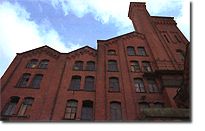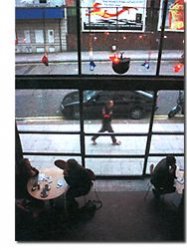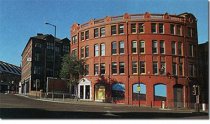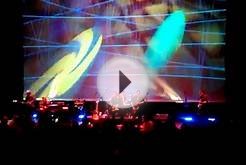 (The online version of this article appears in three parts. Click here to go to part two. Click here to go to part three.)
(The online version of this article appears in three parts. Click here to go to part two. Click here to go to part three.)
WE hit speeds of more than 110 miles per hour on the road between Sheffield and Manchester, weaving among three lanes as a light rain fell. Eddy Rhead was sober and meticulous behind the wheel. He politely flashed his high beams before passing, and downshifted smoothly on curves. His navy-blue T-shirt warned, NEW YORK CITY FIRE DEPARTMENT: KEEP 200 FEET BACK. The other cars on the motorway seemed to be stuck in molasses. Tom Wainwright sat in the front passenger seat and casually looked back at me, explaining the various door policies at local nightclubs. Wainwright was a popular disc jockey based in Manchester; Rhead was his roadie for the evening; and the rented Ford was being pushed near its operational limits to reach the next gig in time. We were headed for the Haçienda, a club as notorious in the United Kingdom as Studio 54 once was in the United States. A group of Wainwright's fans, who had watched him DJ at a Sheffield club earlier in the evening, now struggled to keep up with us. They were crammed into a small Vauxhall that fell behind, vanished for long stretches, and then suddenly reappeared in our rearview mirror. Rhead and Wainwright saw nothing unusual in the mist and the mad rush and the blur of scenery flying past us, like a video played on fast forward. This was part of the routine. It was just another Saturday night in the north of England.
 On the outskirts of Manchester we passed empty lots, abandoned factories, warehouses with broken windows - an industrial wasteland punctuated by row after row of modest brick houses. There was more life downtown, amid the faded grandeur of massive Victorian buildings. Rhead slowed down considerably to avoid pedestrians, but ran a few red lights too, hitting Whitworth Street at twelve-thirty, right on time.
On the outskirts of Manchester we passed empty lots, abandoned factories, warehouses with broken windows - an industrial wasteland punctuated by row after row of modest brick houses. There was more life downtown, amid the faded grandeur of massive Victorian buildings. Rhead slowed down considerably to avoid pedestrians, but ran a few red lights too, hitting Whitworth Street at twelve-thirty, right on time.
About twenty or thirty people stood in front of the Haçienda, hoping to get inside. They had come from all over the north, from Blackpool and Preston, from Bradford, Leeds, and Stoke-on-Trent, some of them driving for hours just to dance here tonight. The building was low and unexceptional. It had once served as a yacht warehouse. You could hear muffled bass notes through the brick walls, a dull, thumping four-four beat. Rhead removed cases of twelve-inch singles from the trunk and handed a couple to me. This was as far as he would go. Rhead wouldn't set foot in the Haçienda. It had been his hangout for years, a "brilliant" place, the best, nothing like it, but lately everything had changed. The club had a different feeling now, a much darker one; bad things were happening inside. Rhead said good-night and got back into the car. I turned and followed Wainwright, helping him carry the discs. The crowd parted for us, a bouncer opened the door, the calm of the street fell away, and we stepped into the maelstrom of a teenage party, hot and sweaty, with people dancing, strobe lights flashing, and music so loud it seemed to have acquired a physical presence - so loud that I could not only hear it but feel it, as though a stiff breeze were emanating from the speakers and somehow penetrating to the bone.
 THE popular culture of Great Britain has long been torn between contradictory impulses, often symbolized by the rivalry between north and south, between a faith in the common people and a proud elitism, between an urban, working-class sensibility and one that cherishes tradition, rank, and the arcadian values of country life. At the moment, the north is ascendant. You can see its newfound prestige in the current mania for soccer stars, in the success of films like Trainspotting and The Full Monty. Most of all, you can hear it in the music. The stale gentility of the Thatcher era has given way to a culture that is iconoclastic, often outrageous, and fed up with the trappings of hereditary privilege. The election of Tony Blair's Labour government only confirmed a change in popular attitudes that had been mounting for years. British youth culture has been exerting a sort of influence, both at home and overseas, that the United Kingdom has not enjoyed for thirty years. Laura Ashley prints and Brideshead Revisited nostalgia are long gone. There's a craving for the shock of the new, and middle-class kids in England are once again dressing down and dropping their aitches.
THE popular culture of Great Britain has long been torn between contradictory impulses, often symbolized by the rivalry between north and south, between a faith in the common people and a proud elitism, between an urban, working-class sensibility and one that cherishes tradition, rank, and the arcadian values of country life. At the moment, the north is ascendant. You can see its newfound prestige in the current mania for soccer stars, in the success of films like Trainspotting and The Full Monty. Most of all, you can hear it in the music. The stale gentility of the Thatcher era has given way to a culture that is iconoclastic, often outrageous, and fed up with the trappings of hereditary privilege. The election of Tony Blair's Labour government only confirmed a change in popular attitudes that had been mounting for years. British youth culture has been exerting a sort of influence, both at home and overseas, that the United Kingdom has not enjoyed for thirty years. Laura Ashley prints and Brideshead Revisited nostalgia are long gone. There's a craving for the shock of the new, and middle-class kids in England are once again dressing down and dropping their aitches.
During the "beat boom" of the early 1960s, Liverpool was the trendsetter, home of the Beatles' "Mersey sound." For the past decade another northern city, Manchester, which though only thirty miles from Liverpool considers itself a world apart, has led the way in music, fashion, and graphic design. Both the rise of electronic dance music and the current revival of British rock-and-roll got their start in Manchester's clubs. In the summer of 1988 the city became a latter-day Haight-Ashbury, as young people from all over England and Europe flocked to a club scene, dubbed "Madchester, " whose ground zero was the dance floor at the Haçienda. An urban center once famous for its factory system became renowned for its nightlife, for the rock clubs, bars, and dance clubs opening in abandoned warehouses downtown.
Manchester's local government has encouraged this hip new image, hoping to create a postmodern, postindustrial economy based largely on entertainment. But youth culture changes rapidly; trendy scenes can vanish overnight; and the drugs and violence that doomed Haight-Ashbury's brief reign now threaten to end Manchester's. The city today has a surreal, highly charged atmosphere. Its plight says a great deal about what has happened lately in the "other" England - the great northern industrial cities that rarely appear in British tourist brochures. Amid long-term unemployment and some of the worst urban poverty in Western Europe, the "dark Satanic" mills of Manchester deplored by Victorian social reformers are being turned into tapas bars and discos.






